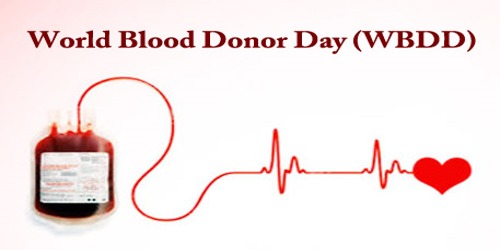Every year, on 14 June, countries around the world celebrate World Blood Donor Day (WBDD). The event serves to raise awareness of the need for safe blood and blood products and to thank blood donors for their life-saving gifts of blood.
World Blood Donor Day is one of eight official global public health campaigns marked by the World Health Organization (WHO), along with World Health Day, World Tuberculosis Day, World Immunization Week, World Malaria Day, World No Tobacco Day, World Hepatitis Day, and World AIDS Day.
Blood is an important resource, both for planned treatments and urgent interventions. It can help patients suffering from life-threatening conditions live longer and with a higher quality of life, and supports complex medical and surgical procedures. Blood is also vital for treating the wounded during emergencies of all kinds (natural disasters, accidents, armed conflicts, etc.) and has an essential, life-saving role in maternal and perinatal care.
History –
World Blood Donor Day was first celebrated in 2004 to spread awareness about the need for regular blood donations and its requirement to save lives. On this day Blood Donors donate blood themselves to save the lives whether of accident victims or those who are in need of blood transfusion for the surgeries.
Transfusion of blood and blood products helps and save millions of lives every year. It can help patients suffering from life-threatening conditions live longer and with higher quality of life, and supports complex medical and surgical procedures. It also has an essential, life-saving role in maternal and perinatal care. Access to safe and sufficient blood and blood products can help reduce rates of death and disability due to severe bleeding during delivery and after childbirth.
In many countries, there is not an adequate supply of safe blood, and blood services face the challenge of making sufficient blood available, while also ensuring its quality and safety. An adequate supply can only be assured through regular donations by voluntary unpaid blood donors. The WHO’s goal is for all countries to obtain all their blood supplies from voluntary unpaid donors by 2020. In 2014, 60 countries have their national blood supplies based on 99-100% voluntary unpaid blood donations, with 73 countries still largely dependent on family and paid donors.
World Blood Donor Day is celebrated every year by people around the world on June 14. It is celebrated on the birthday anniversary of Karl Landsteiner on June 14, 1868. This Day brings a precious opportunity to all donors to celebrate and commemorate the birthday anniversary of Karl Landsteiner (a scientist who won the Nobel Prize for his discovery of the ABO blood group system).
Objectives of celebrating World Blood Donor Day:
- To provide a global platform to thank individuals who donate blood and to encourage those who have not yet donated.
- To raise awareness that blood donation action benefits the society as a whole.
- To promote and support effective national blood donor programs and the elimination of a dependency on family/replacement and paid blood donation.
- To ensure and to promote international collaboration worldwide about the principles of voluntary non-remunerated donation, while increasing blood safety and availability.
- In order to maintain an adequate supply of blood for all patients throughout the year requiring transfusion.
- To encourage people to donate blood regularly on an unpaid basis.
- To promote low-risk behavior so that individual can protect their health and be safe to donate blood.
The collaborative effort of the World Health Organization in promoting and celebrating World Blood Donor Day with a proper theme to encourage people for blood donation and saving life or to help who is need of blood.
A blood service that gives patients access to safe blood and blood products in sufficient quantity is a key component of an effective health system. Ensuring safe and sufficient blood supplies requires the development of a nationally coordinated blood transfusion service based on voluntary non-remunerated blood donations. However, in many countries, blood services face the challenge of making sufficient blood available, while also ensuring its quality and safety.
Information Sources:
















